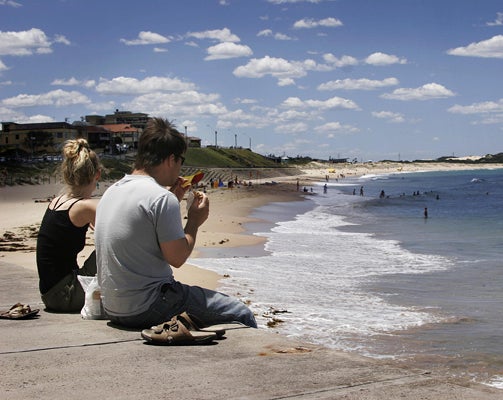Relocate: Turn over a new leaf in a life Down Under
A better quality of life and a growing economy is luring UK workers to Australia

For British people, the concept of moving to Australia has undergone serious transition over the past few hundred years. In the Victorian era, the country was used as a dumping ground for convicted British criminals, who arrived in vast transportation ships. And in the aftermath of the Second World War, more than one million Brits were encouraged to emigrate to Oz for the princely sum of £10, taking advantage of the Australian government's morbidly titled "Populate or Perish" immigration policy.
The days of transportation and the "£10 Poms" have long gone, but recent figures suggest that British people are once more seeing Australia as a viable place to live, work and raise a family. Over the past five years, the number of people making the switch has risen by a staggering 300 per cent, and in 2006 alone more than 23,000 Brits successfully resettled Down Under.
"Apart from obvious reasons such as the climate, people come to Australia because they see a future for themselves and their families that they don't necessarily see elsewhere," says John Mumford, managing director of Visa Unit, a specialist emigration company based in the UK. "It's not just about the money or the weather, it's about the opportunities. The language is also the same – apart from the slang, of course."
This trend looks set to continue. The Australian government is keen to attract as many of the world's best and brightest as it can: it recently increased its yearly target figure for skilled workers entering the country to 102,500. But this policy is definitely not aimed at school-leavers looking for some temporary work in a beach bar to fund the excesses of their gap year. It's about attracting highly skilled workers, from teachers, doctors, nurses and accountants to plumbers, carpenters and IT professionals.
Matthew Foster, 30, moved to Australia three years ago after tiring of the wind, rain and lack of jobs in his native Yorkshire. After six months of backpacking, he found work at a small software firm in Sydney and began climbing the ladder, eventually becoming the company's director.
"The typical workplace in Australia is a far more relaxed and informal environment than in the UK, but the people are just as productive," he says. "The opportunity to move on up within organisations is also more clearly defined, which helps with motivation. Brits are highly regarded here: as well as being the victims of Aussie sporting success, they can rise rapidly up the job ladder."
Another British émigré living in Sydney is 30-year-old Dominic Roberts. Like Foster, he decided to relocate three years ago, and now runs a recruitment company. His experience even inspired his UK-based parents to set up a website aimed at other potential emigrants, after finding it hard to get necessary information about jobs and visas.
"A big issue was the quality of life," says Roberts. "Australia has major economic prospects for growth, and there's an energy and enthusiasm that you just don't see in the UK. My own experiences out here have been very formative: I'd say it's possible for workers from most sectors to make the shift, despite the myths that suggest otherwise."
The first port of call for anyone looking to relocate their career Down Under are the offices of a registered migration agent. These are specialist advisers who are well informed about the latest developments in the Australian immigration system, and will tailor their advice to meet a client's requirements. They can tell you quickly if the skills you have are currently in demand in Oz, and also what job opportunities there might be.
Moving to Australia is still relatively straightforward, but new legislation introduced last September has made the process more restrictive. The hope is that this will persuade the best people to remain in the country indefinitely, rather than simply returning to their home countries once they feel they've had their fill of another lifestyle. This change is important if you're a recent graduate thinking of moving to Australia to continue your studies.
"Many graduates can be under the illusion that just because they have a degree they have a passport to Australia, but this is not necessarily the case," says John Mumford of Visa Unit. "Work experience is a vital part of almost all types of visa once you have qualified in your skill or trade. Planning is essential and you need to know the rules."
Moving to Oz – where to start
- www.nextstepaustralia.com is a site set up by a couple from Leeds and their Sydney-based son. It features job vacancies, information about visas and accommodation advice.
- Another UK-oriented site, www.thinkingaustralia.com, has a list of registered migration agents and offers advice on renting or buying a house down under.
- The Australian government's immigration department, www.immi.gov.au, has information on the General Skilled Migration programme, which favours those who work in skilled professions.
- If you're a recent graduate and want to continue your studies in Oz, then the Australian government's official site should be your first port of call: www.studyinaustralia.gov.au. It has information about universities, scholarships and courses.
Join our commenting forum
Join thought-provoking conversations, follow other Independent readers and see their replies
0Comments